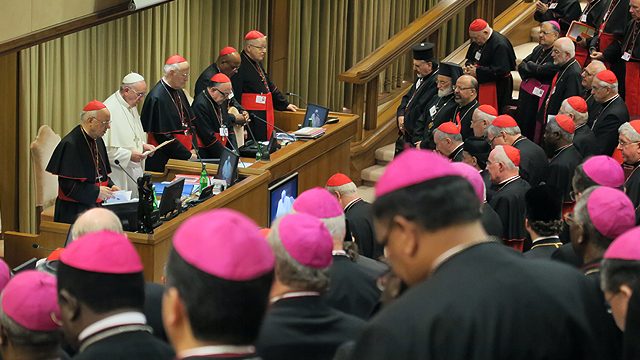Pope Francis’ Remarks at First Session of Synod of Bishops on the Family
Salt + Light Media
Tuesday, October 6, 2015

Pope Francis addressed the General Assembly of the Synod of Bishops on Monday morning - the morning of their first full day of sessions. Below, please find Vatican Radio's full English translation of the Holy Father's remarks.
Dear Beatitudes, Eminences, Excellencies, brothers and sisters,The Church today takes up once again the dialogue begun with the announcement of the extraordinary Synod on the family, and certainly even long before that, to evaluate and reflect on the text of the Working Document (Lt.Instrumentum laboris), elaborated on the basis of the [Extraordinary Assembly’s] final report (Relatio Synodi) and the responses of the Bishops’ Conferences and from the other organizations with the right to contribute.The Synod, as we know, is a journey undertaken together in the spirit of collegiality and synodality, on which participants bravely adopt parrhesia, pastoral zeal and doctrinal wisdom, frankness, and always keep before our eyes the good of the Church, of families and the suprema lex, the Salus animarum.I should mention that the Synod is neither a convention, nor a parlor, nor a parliament or senate, where people make deals and reach compromises. The Synod is rather an Ecclesial expression, i.e., the Church that journeys together to read reality with the eyes of faith and with the heart of God; it is the Church that interrogates herself with regard to her fidelity to the deposit of faith, which does not represent for the Church a museum to view, nor even something merely to safeguard, but is a living source from which the Church shall drink, to satisfy the thirst of, and illuminate, the deposit of life.The Synod moves necessarily within the bosom of the Church and of the holy people of God, to which we belong in the quality of shepherds – which is to say, as servants. The Synod also is a protected space in which the Church experiences the action of the Holy Spirit. In the Synod, the Spirit speaks by means of every person’s tongue, who let themselves be guided by the God who always surprises, the God who reveals himself to little ones, who hides from the knowing and intelligent; the God who created the law and the Sabbath for man and not vice versa; by the God, who leaves the 99 sheep to look for the one lost sheep; the God who is always greater than our logic and our calculations.Let us remember, however, that the Synod will be a space for the action of the Holy Spirit only if we participants vest ourselves with apostolic courage, evangelical humility and trusting prayer: with that apostolic courage, which refuses to be intimidated in the face of the temptations of the world – temptations that tend to extinguish the light of truth in the hearts of men, replacing it with small and temporary lights; nor even before the petrification of some hearts, which, despite good intentions, drive people away from God; apostolic courage to bring life and not to make of our Christian life a museum of memories; evangelical humility that knows how to empty itself of conventions and prejudices in order to listen to brother bishops and be filled with God – humility that leads neither to finger-pointing nor to judging others, but to hands outstretched to help people up without ever feeling oneself superior to them.Confident prayer that trusts in God is the action of the heart when it opens to God, when our humors are silenced in order to listen to the gentle voice of God, which speaks in silence. Without listening to God, all our words are only words that are meet no need and serve no end. Without letting ourselves be guided the Spirit, all our decisions will be but decorations that, instead of exalting the Gospel, cover it and hide it.Dear brothers, as I have said, the Synod is not a parliament in which to reach a consensus or a common accord there is recourse to negotiation, to deal-making, or to compromise: indeed, the only method of the Synod is to open up to the Holy Spirit with apostolic courage, with evangelical humility and confident, trusting prayer, that it might be He, who guides us, enlightens us and makes us put before our eyes, with our personal opinions, but with faith in God, fidelity to the Magisterium, the good of the Church and the Salus animarum.In fine, I would like to thank: His Eminence Cardinal Lorenzo Baldisseri, Secretary General of the Synod; His Excellency, Archbishop Fabio Fabene, Undersecretary; and with them I thank the Rapporteur, His Eminence Cardinal Peter Erd? and the Special Secretary, His Excellency Archbishop Bruno Forte; the Presidents-delegate, writers, consultors, translators and all those who worked with true fidelity and total dedication to the Church. Thank you so much!I also thank all of you, dear Synod Fathers, fraternal delegates, auditors and assessors, for your active and fruitful participation.I want to address a special thanks to the journalists present at this time and to those who follow us from afar. Thank you for your enthusiastic participation and for your admirable attention.We begin our journey by invoking the help of the Holy Spirit and the intercession of the Holy Family: Jesus, Mary and Joseph. Thank you.
Related Articles:
Tag: 寬恕
教宗方濟各在馬斯克瓦西斯:我為許多基督徒的惡行向原住民請求寬恕
Wednesday, July 27, 2022
 鹽與光
鹽與光
教宗方濟各在加拿大訪問的首項公開活動在馬斯克瓦西斯舉行,他在那裡會見了原住民的代表們。教宗提到過去「同化政策」下的受害兒童,為教會成員造成的傷害向原住民表示道歉。
張汝南執事-常年期第二十四主日反省
Saturday, September 12, 2020
 張汝南執事
張汝南執事
張汝南執事:「今天我們慶祝常年期第二十四主日,讓我們感謝天主的慈悲,祈求天主賜給我們力量,向傷害過我們的人從心中寬恕, 學習『上主富於仁愛寬恕,極其慈悲,遲於發怒。』詠103:8」
教宗:天主寬恕我們,只要我們寬恕他人
Tuesday, March 6, 2018
 鹽與光
鹽與光
2018年3月6日,教宗方濟各在彌撒時再次強調寬恕這一主題。教宗表示,被天主寬恕的第一步是要承認自己是罪人。
教宗公開接見: 天主總是賦予罪人再站起來的尊嚴
Thursday, March 31, 2016
 鹽與光
鹽與光
2016年3月30日上午,教宗方濟各在聖伯多祿廣場主持週三公開接見活動,三萬多名信友參加。教宗在要理講授中勉勵眾人信任天主的寬恕,不要自責。天主將罪連根拔除,若我們希望得到寬恕,也應寬恕別人。
1
SUPPORT LABEL
$50
$100
$150
$250
OTHER AMOUNT
DONATE
Receive our newsletters
Stay Connected
Receive our newsletters

Stay Connected












